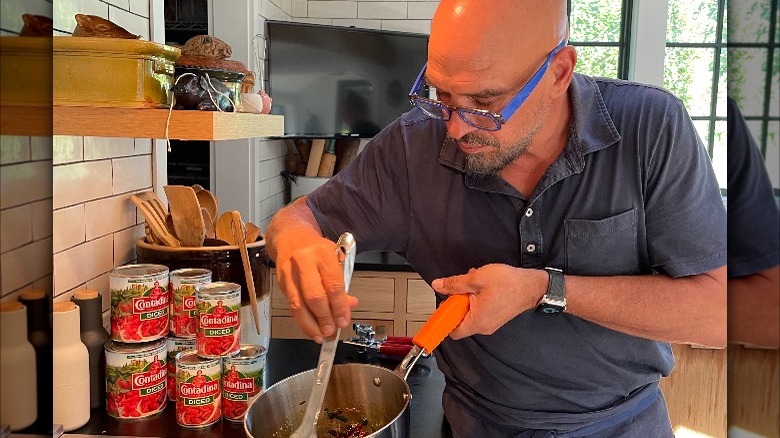Michael Symon's Canned Food Rule You Should Never Break - Exclusive
We hold this truth to be self-evident: Not all canned foods are inherently evil. The latest course books on such subjects (and believe us, they exist!) estimate that over 1,300 kinds of canned foods exist to be purchased in the world. What's more, human thirst for the packaging type is nearing the unquenchable. Fortune Business Insights estimates that the global canned food market is growing and will top $100 billion by 2027 — which means that maybe it's time to have the talk.
There are certain canned foods that you should never invite into your kitchen; some, on the other hand, are safer to stock in your pantry than others. This is something that celebrity chef Michael Symon knows well. Symon, who sat down with Mashed recently to celebrate his partnership with Contadina (yup, those are canned tomatoes), explained to us his rule of thumb for picking a solid canned food from your supermarket shelf.
How Michael Symon picks canned foods
Michael Symon won't pick a canned food based on the beauty of its label. Instead, he reads first. "When you grab a can of anything, a very good thing to be aware of immediately is how much or how little is on the can," the Iron Chef told Mashed. "If I grab a can of something and it has 47 different ingredients in it and 39 of them I can't pronounce, [it's] probably not a good option for me [for] the way that I like to cook or choose to cook."
When it comes to canned foods, says Symon, the simpler the better. "When you look at something and you're like, 'Oh, there's not a ton of things listed here,' we're in a great place right off the rip. That's a very important thing to me," Symon advised. "A lot of times with the canned stuff, there's a lot of things that you can't pronounce, can't say, and that's not what you're looking for when you're looking for a product. You want less things in the product."
As a rule, Symon also stays away from canned foods with artificial flavors, preservatives, and GMOs. If you're looking specifically for a good canned tomato, pay attention to how they're peeled and processed. You want something vine-ripened instead of "gassing to get it to be ripe." You'll also want them steam peeled, Symon explained, "so there's no weirdness going on with how they're choosing to peel the tomatoes before they end up in the can."
Contadina ticks all those boxes, and Chef Michael Symon developed a new recipe for his partnership with the company! Check it out by visiting his Instagram.
Make sure to check canned goods for damage
In addition to Michael Symon's advice about ingredients and processing of canned goods, you should always be sure to thoroughly examine canned goods before you purchase them. While your examination should of course include the label and the expiration date, perhaps even more important is the integrity of the can.
As explained by UnlockFood, the manufacturing process involves heating and vacuum-sealing the canned goods to kill off and prevent microorganisms from contaminating the contents. However, if a can gets dented or otherwise damaged, bacteria can get inside and spoil the food. Leaking cans also signal some kind of damage, and likely contamination.
Another abnormality to look out for is bulging or swelling. According to the FDA, swelling is most commonly caused by spoiled contents, but it can also result from chemical reactions between food and the can's metal, or even storage conditions that are too warm. Regardless, you should avoid buying cans that are damaged in any way so you can avoid food poisoning.
How to store your canned goods for the best shelf life
Even after you've examined the canned food ingredients and overall can integrity, there's one last task: storing your canned goods properly. Many of us simply shove our canned goods in the pantry or on a shelf in the basement, which usually works out well enough, but there are a few things to keep in mind.
Per Utah State University, canned goods should be kept in a cool, dry place that maintains a fairly stable temperature. You also don't want to keep canned goods someplace that could get too cold, as this too can damage the cans' integrity. On the same note, moisture can cause rusting, and we definitely don't want that.
One last thing to consider is rotating your canned goods. For instance, as you buy new items, place them behind older items. This ensures that older cans get used first and don't go to waste. You should also keep track of expiration dates. The USDA recommends keeping high-acidity canned goods like tomatoes for no more than 18 months, and low-acidity canned goods like soup for no more than five years.



